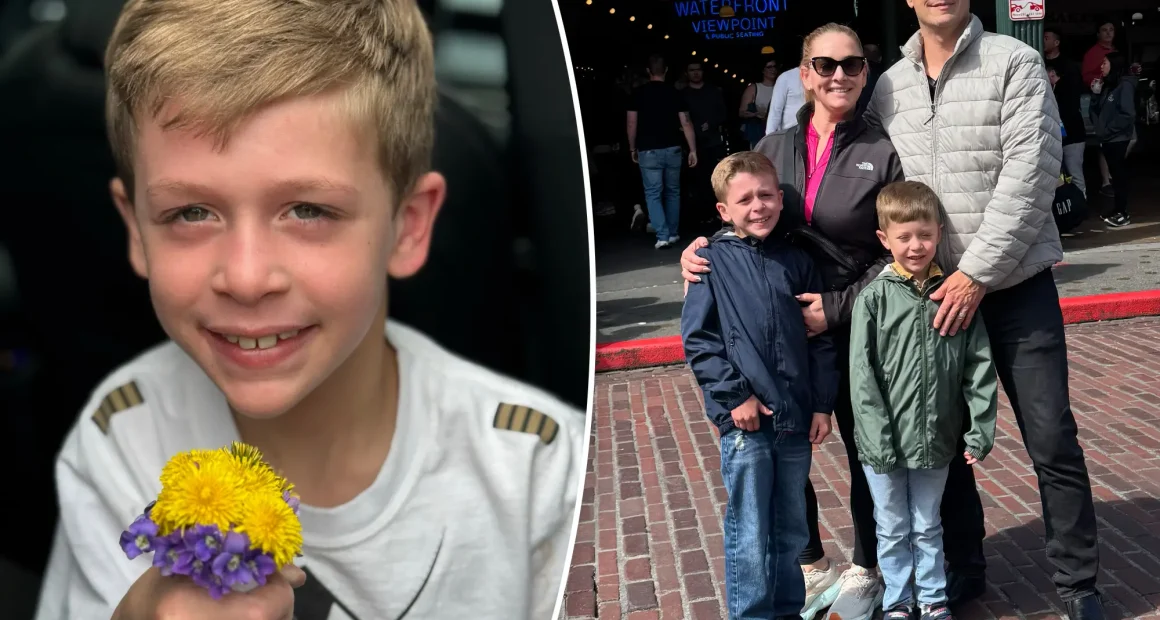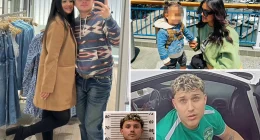Ryan Baldridge Jr. was a bright, chatty toddler — flying through flash cards, picking up an “astonishing” vocabulary, and hitting every developmental milestone with ease.
But at 18 months, everything changed.
“It was like he was erased and reset,” recalled his father, Ryan Baldridge Sr. “Everything shifted.”
Almost overnight, the boy his family calls Junior lost his ability to speak in full sentences. Instead, he began echoing fragments of other people’s words, caught in a speech disorder known as echolalia.
Ryan Baldridge Jr. — “Junior” to his family — began showing signs of echolalia before he turned 2.
“The words he knew from the flash cards, all that vocabulary, it was gone,” his mother, Kimberly, recalled. “He wasn’t speaking for himself anymore.”
Today, at nearly 9 years old, Junior has found his voice again — thanks to leucovorin, a decades-old, low-cost drug that’s giving some children with autism the chance to finally be heard.
Losing words, gaining questions
After his speech faded, Junior developed other traits associated with autism: avoiding eye contact, walking on tiptoes, and struggling to connect with peers.
Alarmed, the Baldridges turned to their pediatrician — only to have their concerns dismissed.
“This was our first child, so we didn’t have anything to compare it to,” said Ryan Sr., 43, of St. Louis. “But deep down, we knew something wasn’t right.”
At age 4, Junior was officially diagnosed with autism. His parents enrolled him in intensive applied behavior analysis therapy, five days a week, with a one-on-one specialist helping him build basic life skills.
Still, late at night, the Baldridges scoured the internet, searching desperately for other answers.
In addition to his speech challenges, Junior struggled with eye contact and often walked on his tiptoes.
The $100 drug that changed everything
Desperate for answers, the Baldridges’ research eventually led them to Dr. Richard Frye, a pediatric neurologist investigating a possible link between autism and cerebral folate deficiency — a shortage of vitamin B9 in the brain.
The condition is often caused by folate receptor alpha (FR⍺) autoantibodies, which block folate from reaching the brain. Studies show that more than 75% of children with autism carry these antibodies, compared with just 10% to 15% of children without the disorder.
Frye wondered if leucovorin — a decades-old, generic form of vitamin B9 traditionally used to reduce the toxic effects of chemotherapy — could bypass that blockage and restore folate to the brain.
In 2012, he launched a clinical trial. The results were striking: about one-third of children with autism who took leucovorin twice daily showed significant improvements in speech and language. None experienced serious adverse effects, and minor side effects like hyperactivity quickly faded.
Perhaps just as remarkable, the treatment was affordable. Leucovorin costs roughly $100 a month without insurance — often less with coverage, according to GoodRx.
Leucovorin was first approved by the FDA in 1952.
For the Baldridges, however, simply getting Junior tested for the FR⍺ antibody proved to be an uphill battle. Five different doctors refused to sign the required form.
“They just kept saying, ‘No, that’s a scam,’ or that they didn’t know what it was,” said Kimberly, 42. “We didn’t need them to interpret the results. We just needed a doctor’s signature so we could have the information as parents.”
“The kickback and the gaslighting was the most frustrating part,” she added.
At last, a functional medicine doctor agreed to help. Eight weeks later, the results came back: Junior had tested positive for high levels of the FR⍺ antibody.
A miraculous turn
With answers finally in hand, the Baldridges met with Dr. Frye, who prescribed leucovorin and advised cutting dairy from Junior’s diet, since it can interfere with the drug’s effectiveness.
The change was almost immediate. Within two weeks, Junior was speaking in full sentences again.
ince starting leucovorin, Junior has been able to transition into a mainstream school, his parents said.
For Ryan Sr., one moment in particular left him stunned. It happened during an ordinary drop-off at Junior’s therapy program.
“I got out of the car with him and said, ‘Alright, bye Ry,’” Ryan recalled. “And he said, ‘Bye, Dad. I love you.’”
It was the first time his son had spoken those words without echolalia.
“I got back in the car and cried for five minutes before I could even drive off,” Ryan said.
Ryan Baldridge Sr.
Today, Junior continues to make strides. He no longer walks on tiptoes and now attends mainstream school alongside his younger brother.
“Junior was able to skip kindergarten and go straight into first grade,” Ryan said proudly. “He initiates play and he’s a social butterfly.”
Cautious hope
Leucovorin has even caught political attention — former President Trump recently called it an “amazing” drug and suggested it could be an “answer to autism.”
But experts urge restraint.
“If you’re going to the doctor looking for an autism pill, it doesn’t exist,” Dr. Frye told The Post in March. “But leucovorin has helped a lot of children.”
Dr. Richard Frye has worked with autistic children for more than two decades.
He stressed that many of his patients continue other interventions while taking leucovorin, including ABA and speech therapy.
“You have to treat a lot of things to make the body well,” he said. “What [leucovorin] does, we think, is accelerate the effectiveness of all these therapies.”
The Autism Science Foundation, however, has not yet endorsed leucovorin as a treatment, calling the current evidence “very early and inconclusive.” The nonprofit emphasizes the need for larger, more rigorous trials, noting that positive results so far come from only a handful of small studies.
Despite the caution, the FDA is moving forward. Earlier this week, the agency announced it is in the process of approving a tablet version of leucovorin for patients with cerebral folate deficiency.
“Children are suffering and deserve access to potential treatments that have shown promise,” FDA Commissioner Dr. Marty Makary said in a press release.
Junior recently started second grade — and scored 100% on his first spelling test.
In the two years since starting leucovorin, he has made remarkable strides, though his parents note he still shows some autism traits, including occasional challenges with eye contact and emotional regulation.
For the first time, he’s talking, dreaming, playing, and pretending — even setting his sights on becoming a pilot one day.
“It gives me hope and comfort thinking he’ll grow up to be a self-sufficient man who contributes to society and runs his own life,” Ryan said. “I don’t know if that’s going to be the case, but every day seems more and more likely that it could really be a possibility for him.”
Looking ahead, Kimberly hopes every child showing signs of autism or speech delays can be tested for the FR⍺ autoantibody.
“My advice to parents is to keep fighting, never settle, and always question your doctor,” she said. “You’ll be able to know if the medication might help based on that result. It’s step one.”















